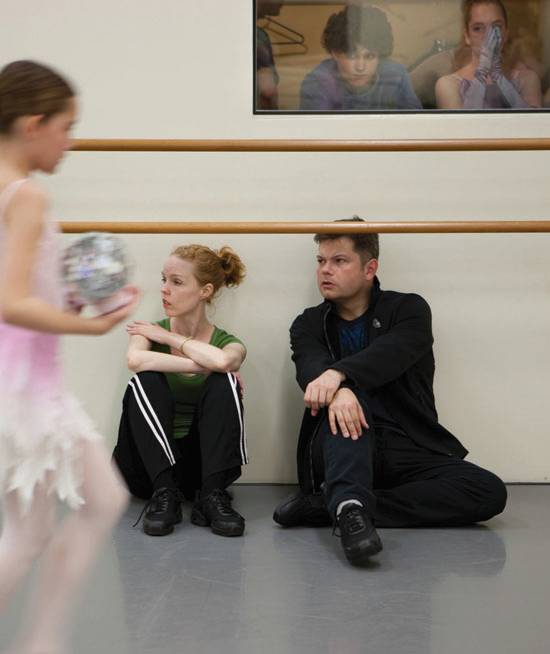Tracy McCabe is either an artist with business knowhow or a businessman with a love for the arts – but it depends on who you ask.
On the University of Illinois at Urbana-Champaign (UIUC) campus, McCabe is best known for his role as the Associate Dean for External and Alumni Affairs in the College of Business – a job in which he “friend raises,” in addition to building and marketing a brand on behalf of the University. But the framed Champaign Urbana (CU) Ballet production photos that line the walls of McCabe’s college office indicate that his interests are not purely academic.
When he leaves the UIUC, McCabe assumes his role as producer of the CU Ballet, a job that utilizes his business savvy in fundraising, marketing and management tasks. But McCabe’s work does not stop there; he also assists CU Ballet Artistic Director Deanna Doty with theatrical choreography and libretto development for story ballets such as “The Nutcracker” and the company’s May 2011 production of “Sleeping Beauty.”
A 2003 NEA study reported that between 1987 and 1997, the number of dance companies nationwide increased from 188 to 363. The Midwest, in whose statistics Illinois was a key player, boasted 61 companies in 1997. In Champaign-Urbana, the CU Ballet is the top dog – making McCabe the local Alpha male.

Tracy McCabe. Photo by Jason Lindsey.
The dark-haired, well-built McCabe was born in 1967 into an Irish family of five, making him the youngest of four children. It was at his family’s home in Springfield, Ill., McCabe said, that he had his first exposure to theatre and ballet.
“I went to an all-boys Catholic high school, so my interests were not necessarily the status quo,” McCabe explained. “It was during high school that I got involved with community theatre, which led me to community ballet.”
A community production of “A Chorus Line” cast McCabe alongside Grace Luttrell Nanavati, the director of Springfield’s local ballet; after seeing McCabe’s skills, Luttrell asked him to perform in her studio’s production of “The Nutcracker.”
“She asked me to dance the Russian variation…which is only 60 seconds long,” McCabe recalled. “I absolutely fell in love with the athleticism and the challenge of it.”
But McCabe’s passion for ballet is not purely physical – a good thing, considering that he is “not particularly talented” at doing it. Or so he says.
“I think Tracy started dancing late, so he probably has a lower opinion of himself than he should,” said CU Ballet Ballet Mistress Emily Buss. “Technically, he hasn’t had the experience that a person gets dancing 25 hours a week at age 13…but he has fantastic turns. He can do four pirouettes in sequence just demonstrating in class.”
McCabe explained that ballet was “very purposefully” never a career for him, but that it has always been a passion.
“I had great ballet teachers who pushed me, but I knew that my ambitions were never professional; they were always intellectual,” McCabe said. “I love doing ballet, but I love understanding it as much as I love doing it.”
McCabe explained that his true calling is being an advocate for ballet. And for that, he has undeniable talent.
“Tracy is the backbone behind the [CU Ballet],” said UIUC Department of Dance Lecturer Philip Johnston, who is a personal friend of McCabe’s. “He has great entrepreneurial skills…he is a terrific fundraiser. I think without him, the company wouldn’t have been propelled into becoming what it is now.”
UIUC Visiting Lecturer John Dayger agreed.
“It is kind of because of Tracy – who is such an impresario – that the CU Ballet gets backing from a lot of organizations – they get a lot of free space,” Dayger said. “Tracy knows how to schmooze… he gets ads on the buses, he knows a lot of people…and that is how he and Deanna are able to support the grand undertaking that is the CU Ballet.”
Johnston explained that the CU Ballet organizes a fundraiser auction every year at the Refinery, a health club in Champaign.
“Tracy gets the glitterati of town to show up to those things and to give a lot of money to the company,” Johnston said.
But McCabe’s job is not always so glamorous. The most challenging part of his job, McCabe explained, is managing stress – knowing that at the end of the day, the success of much of what he does depends on other people responding positively and actively to his efforts.
“If I am trying to help the college position a graduate program, people have got to sign up; if I am marketing a ballet, I am sweating bullets until the last ticket is sold,” McCabe said. “I have to rely on the effectiveness of my work. I have to rely on the fact that what I am doing interests other people.”

CU Ballet company dancers Alexandra Warwick and Mark Deler in The Sleeping Beauty. Photo by Dan Merlo
With the CU Ballet’s performance of “Sleeping Beauty” just around the corner, McCabe has been a busy man; he is working to launch a fundraising campaign that will last for the next two years, planning the CU Ballet’s annual soiree, and directing, choreographing – and maybe even dancing in – “Sleeping Beauty.”
At present, McCabe and Dayger are scheduled to share the role of Carabosse, Sleeping Beauty’s wicked fairy godmother.
“[Tracy] has quite a flair for the dramatic,” Dayger said. “He has warned me that we will have big hair for Carabosse, but I don’t know what it will look like yet.”
Dayger has worked with McCabe at the CU Ballet for many years, both designing costumes with his wife Anne de Velder and dancing in productions. During this time, Dayger said, he has found McCabe to be incredibly generous.
“If [Anne and I] call Tracy up and say, ‘We have a mock-up of a mannequin and we need a second opinion,’ he will find a way to get it into his schedule,” Dayger said. “When we go out to dinner for a production meeting, Tracy always picks up the tab. If we are at the ballet costume shop working all day Saturday, Tracy buys us lunch…He is very careful not to make people feel taken advantage of.”
McCabe’s partner, Fabien Wecker, echoed Dayger’s sentiments.
“Tracy gives people assistance if they need it, and he would never ask anything in return…He gives because he wants to,” Wecker said. “Tracy is always willing to share. That is something that he has taught me.”
The problem, Wecker explained, is that Tracy does not know how to limit his giving.
“Even if someone hurt him, and that person asks for assistance, [Tracy] will give,” Wecker said. “He has realized, though, that sometimes people take advantage of him.”
McCabe’s inability to limit himself stems from his incredible passion for all he does, Wecker said. But his relentless concentration can be a double-edged sword.
“[When Tracy does something,] he throws himself into it…When he does Nutcracker, he does Nutcracker and nothing else matters,” Wecker said. “He will focus on that, and that attention is the single most important thing in his life at that point. Everything else vanishes in the background.”
Wecker explained that for McCabe to be taken away from his focus, something else in his life “needs to turn terribly sour.”
“That puts him back on the middle road and brings him back to reality,” Wecker said.
Wecker explained that he met McCabe through then “friend-of-a-friend” Philip Johnston 13 years ago.
“We were at a party, and I told Tracy to go and ask the very good looking gentleman to dance,” Johnston said. “The rest is history!”
Wecker said that his first impression of McCabe was mixed.
“When Tracy told me – this was about 40 pounds ago – that he was the manager of Solo Cup Company, I said, ‘Oh, well, that’s nice,’” Wecker said. “When he told me he was a dancer, I had a moment of disbelief…to me, a male dancer was very thin, or tight, like Philip is. So I wondered what kind of dance Tracy did…I was not very educated about it.”
On less of a surface level, Wecker said he thought that McCabe seemed very nice, and very serious; he was struck by McCabe’s genuine honesty and interest in what others had to say.
But McCabe wasn’t putting on a show to win Wecker’s adoration; Dayger made a similar observation about McCabe.
“One thing I noticed right away [about Tracy] is that he has always got things to do – he’s in a hurry – but if you speak to him, he is listening,” Dayger said. “He will stop and wait, even if it will make him late. I don’t know if that is courtesy or interest, but it is nice to work with people who are like that – people who let you have time to speak.”
McCabe attributes his genuineness to his good parenting; though he lost his father at a young age, McCabe said he learned a lot from him.
“My dad was a great role model, like my mom; he was always emphasizing honesty,” McCabe said. “As an executive responsible for marketing, a field in which there are daily temptations to create perceptions that things are better, faster and smarter, the parental reminder to be genuine and honest is valuable in developing trust in business.”
McCabe said that his dad also instilled in him the need to deliver value to an audience.
“I remember being a 7- or 8-years-old one summer and needing money for candy. I decided to put on a play for the neighborhood kids and charge 25 cents per person,” McCabe said. “Except there wasn’t much of a play…Loads of kids paid admission to see me deliver a couple of really bad punch lines.”
McCabe’s dad, after watching the performance and realizing that his son had “produced a crappy play just to earn some cash,” made McCabe refund everyone’s quarter.
“To this day, I feel tremendous responsibility to give every audience member much more than he or she expects, and much more than the price that a single ticket would require,” McCabe said. “Art should enrich, and my dad and mom instilled a responsibility to deliver quality and value early on.”
Tracy said that in his youth, his mother was incredibly supportive of his love of dance – even though she didn’t entirely understand it.
“I know that she understood the challenge of her son dancing,” McCabe said. “My mom is a farm girl from Springfield…She has been incredibly adaptive to the eye-opening things I have exposed her to during her lifetime and mine. I think that, like many parents, she didn’t know what to make of a boy who dances.”
But that didn’t stand in the way of her involvement.
“I remember once when I was 18, we were getting my clothes ready for a performance,” McCabe said. “I remember her saying, ‘I never thought I would be washing my son’s tights.’ But she did it to show support for me.”
And she continues to get involved; McCabe said that though his mother is almost 80-years-old, he has her “working on something for the CU Ballet all the time.”
McCabe does not have children of his own; he joked that his children are Adult Ballet 1 and Adult Ballet 2, the classes that he teaches at the Champaign Ballet Academy.

CU Ballet artistic director Deanna Doty and McCabe in rehearsal at Champaign Ballet Academy. Photo by Jason Lindsey.
“I work with a lot of kids through the ballet company, so I have somewhat unreasonably high expectations of children. [Having kids] is not something that I would be interested in,” McCabe said. “[Fabien and I] haven’t gotten a dog, because my ballet obsession would keep me from taking care of this needy, living thing.”
McCabe said he gives Wecker credit for enduring his balletomania.
“Fabien is incredibly patient when I spend many late nights at the studio,” McCabe said, “or when I’m pretending to watch a movie with him but I’m actually working on ballet company business – like sewing on trim or stuffing envelopes.”
Wecker said that he and McCabe enjoy going to movies and watching TV together, but that they often “just like to be together in the same room doing independent things.”
The latter, though, has proved to be a dangerous situation – Wecker once tricked McCabe by posing as someone else in an online chat room while the two were sitting in the same room.
“I chatted [Tracy] up for about an hour [under the fake name] and made him believe that I was some very sharp psychoanalyst… [that I was] someone who could read him,” Wecker said.
After getting McCabe to open up to his false persona online, Wecker convinced him that this person was going to move into the house next door to their Champaign home.
“[Tracy] was freaked out,” Wecker said. “I saw that he was bothered by the thought that someone who he had just opened up to could be in Champaign…He said he felt like he was losing control.”
Wecker “let Tracy be” for about 20 minutes before confessing his masquerade. Though the couple can laugh about it now, McCabe took the situation seriously.
“When I told Tracy it was me, he was so relieved, but so mad that someone could exert that kind of control over him,” Wecker said. “I took him out to dinner to make him feel better.”
Buss mentioned that McCabe’s need for control can make him wary to delegate tasks to others at the CU Ballet; he often takes on projects himself to ensure that they are done correctly.
In his job at the University, however, McCabe’s management style is a bit more “hands-off,” said fellow College of Business employee Todd Sweet. Sweet also said that although he has worked under McCabe for six years, he just recently learned of McCabe’s involvement in the Champaign-Urbana dance community.
“I know that [Tracy’s work at the CU Ballet] is almost like a full-time job for him when they are in season, but you wouldn’t know it from working with him here,” Sweet said.
Sweet’s College of Business coworker Sylva Briscoe agreed.
“I knew Tracy had a love for the arts because I ran into him at the Krannert Center for the Performing Arts one night,” she said. “But I never knew he was involved with the CU Ballet.”
It is critically important to McCabe, he said, to make sure that there is a clear line of distinction in how he is using his time and energy; the demands of his University job have to come first.
“My career has always been my career,” McCabe said. “But dance has always been that other thing that I love…It is my baby.”
Looks like McCabe’s title is still up for debate.








